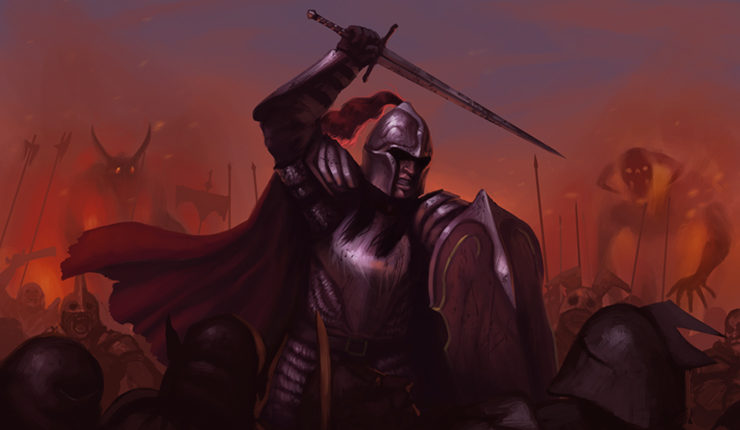In Which Fëanor Goes All Fey, Balrogs Open A Can of Whoop-Ass, and the Oath Gets Well and Truly Underway As the Noldor Reintroduce Themselves to Middle-earth
With the Sindar kingdom of Doriath now established in Beleriand and fenced by the power of Queen Melian, and with Morgoth having stuck himself where the Sun don’t shine, we hit Rewind once again. In this, the thirteenth chapter of the Quenta Silmarillion, “Of the Return of the Noldor,” we go back to the last days just before the first rising of the Moon and the Sun. We also return to Fëanor, who’s got Noldorin boots on the ground in Middle-earth. With him are his sons, his troop of loyalists, and his burning quest of vengeance to achieve. What could possibly go wrong?
This is another very rich chapter and there is a lot of ground to cover. We’ve got Balrog bullies, Orcs galore, maimings, prophetic dreams, Dwarven excavations, and Elf-politics to address. Not to mention Arda’s biggest bird and…its very first dragon!
Dramatis personæ of note:
- Fëanor – Noldo, desperado, historical arsonist
- Maedhros – Noldo, eldest son of Fëanor
- Fingolfin – Noldo, the Elf who would be king
- Fingon – Noldo, valiant son of Fingolfin, harpist adventurer
- Thingol – Sinda, cagey king
- Ulmo – Vala, meddlesome Lord of the Waters
- Finrod – Noldo, cave-dweller
- Turgon – Noldo, city planner
Of the Return of the Noldor
In the land called Lammoth, the Great Echo, which was named after Morgoth’s rage-filled, Ungoliant-inspired cry, you can’t really be too quiet. Even Elves need to watch it. The acoustics are extraordinary. Sound travels: footfalls, voices, candy wrappers, and even the sound of the unjustifiable burning of a small fleet of masterwork Teleri ships in a vile act of treachery. And not only does the Noldor prince Fingolfin spot the flames of his half-brother’s betrayal from far across the strait between Aman and Middle-earth….so do Morgoth’s sharp-eyed Orcs! And they’re much closer.
Soon after, Fëanor leads his considerably smaller host of Elves eastward and upward into the land of Hithlum (“Land of Mists”) and sets up an encampment on the north side of the lake called Mithrim. Before they’ve even settled in, out spills an army of Orcs, issuing from passes in Ered Wethrin, aka the Mountains of Shadow. This is Morgoth thinking it’s best to nip this potential Noldor problem in the bud. They’ve only just arrived on Middle-earth; surely this is the best time to squash them before they have a chance to spread out and put down roots!
But, ahh, Morgoth is forgetting where they’re newly arrived from: Valinor, Aman, and a fresh memory of the Two Trees, the light of which is “not yet dimmed in their eyes.” The Noldor—the best-armed Calaquendi in existence—are actually at the top of their game. Heck, no Elves in the history of Arda are probably more on top of their game than the exiled Noldor, truly superheroes among Eldar. And Fëanor is jacked up with purpose and a thirst for vengeance, to boot.
Now, this marks the Second Battle among the Wars of Beleriand. FYI, battles are going to become a continuing theme in Middle-earth in the First Age from this point on, so through the Elves and their boundless nomenclature,Tolkien gives these conflicts some pretty sweet names.
This one is called Dagor-nuin-Giliath, which means Battle-under-Stars, as it’s the last one taking place before daytime becomes a thing. And in this conflict, Fëanor and his loyalists make short work of the Orcs despite being outnumbered and even caught off guard. What the hell even are these Orcs, anyway? The Noldor would not have seen their like before now! But you know what? They’re violent, they’re uncouth, and seriously unlovely. They’re clearly Morgoth’s minions, and so need slicing up.
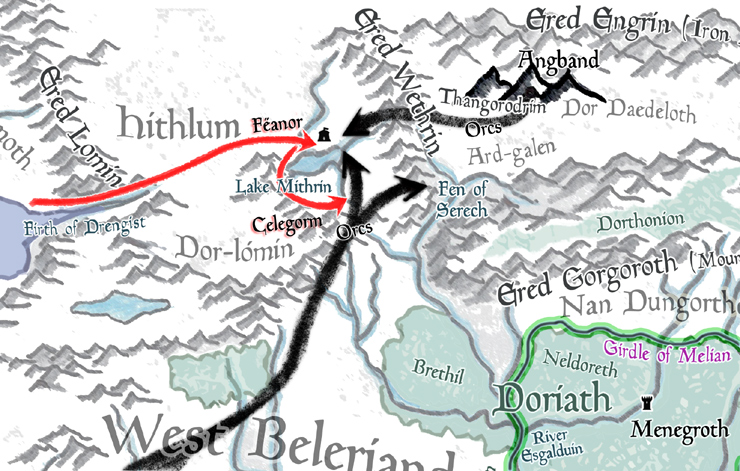
The Noldor get to work with their “long and terrible” swords, mowing down the Orcs before giving chase onto the plains of Ard-galen, aka Morgoth’s very big front lawn. And Fëanor’s son Celegorm leads a portion of Fëanor’s army in an ambush maneuver, crushing a second wave of Orcs who come running up from the south—Orcs who’d been bothering poor Círdan the Shipwright and the other Sindar down by the western shores.
Morgoth’s forces are totally wrecked, and all that remains is likened to a “handful of leaves.” This has to be giving the Dark Lord pause. Like, maybe poking the Noldorin hornet’s nest hadn’t been such a great idea. But the swift victory makes Fëanor cocky. (Well, even more cocky.) He can taste victory! Is this all Morgoth’s got? Fëanor might have come to Middle-earth expecting a long campaign against his foe before finally throwing him down and prying the Silmarils out of Morgoth’s murderous hands—but suddenly the path seems clear right now. Why not run on to where the Orcs had been fleeing, where their master surely dwells under those mountains? So he boldly goes where no Elf has gone before.
Alas, Fëanor knows nothing of Angband—how could he, he only just got here!—nor of all the renovations and monster-making Morgoth’s been working on. But…
even had he known it would not have deterred him, for he was fey, consumed by the flame of his own wrath.
There’s that recurring fire theme that we see throughout Fëanor’s life. All the talent that Fëanor exudes by merely being—talents for crafting, for subtly, for artistry, and now for war—is burning him up fast, driving his choices into a trajectory of madness. Every means, to him, is justified by the end, and the end lies before him: Morgoth is near, and so are the Silmarils. Fëanor thinks he can achieve the demands of his famous Oath right now. Why wait? Strike while the iron is hot, and all that, right?
But Fëanor’s crazy train has long since gone off its rails. So without waiting for his sons and other reinforcements to show up, he hurries on with only a few friends. He crosses right into Morgoth’s domain of Dor Daedeloth and, surprise, the Dark Lord himself is a no-show. Why should Morgoth do the dirty work when he can just send out the Balrog Brigade? Fëanor’s never met them before; hell, he may never even have heard of them.
But to Fëanor’s credit, it takes a whole team of Balrogs to take him down.
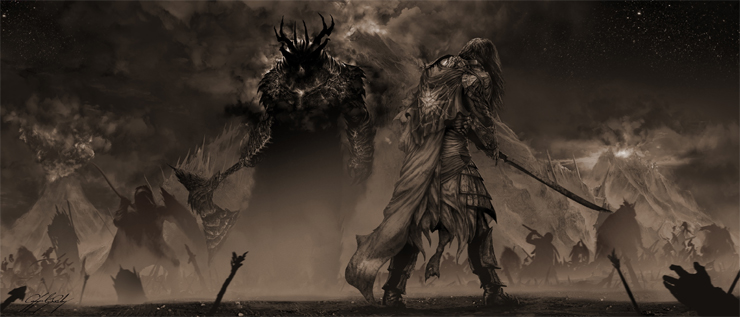
Tragically, in Tolkien’s legendarium, the most epic of contests are assigned the fewest of words. And it’s no different for the final stand of Fëanor. Surrounded by the fiery, whip-wielding demons of terror—the Valaraukar, the scourges of fire—even the intrepid Fëanor cannot stand indefinitely. He is but one Child of Ilúvatar and they are a whole crew of fallen Maiar. Interestingly, we’re given the name of their boss where the narrator hadn’t mentioned it before: Gothmog! That word is actually used once in The Lord of the Rings, where it is the name of a lieutenant of Sauron’s in the siege of Gondor. He might be an Orc or a Man, it’s not made clear, but that guy’s namesake is the goddamned Lord of Balrogs. Yeesh.
“Spoiler” Alert: This original Gothmog is introduced like some sort of celebrity we’ve already heard about, because as he’s named Tolkien wastes no time in forecasting his demise, even as he name-drops someone else. So we’re to understand that Gothmog will one day be slain—to whatever extent a Maia can be extinguished in physical form—at the hands of an Elf named Ecthelion, and in a city not even built yet! Okay, got it! Meanwhile, back to the action….
So it’s Gothmog, Lord of Balrogs, who delivers the “mortal” blow to Fëanor, striking him down with grievous wounds. But of course it’s Fëanor’s own reckless and overwhelming confidence that really defeated him. He was called “fey,” and to be fey is to be doomed to die, which is kind of what he’d been ever since stranding Fingolfin’s crew on the far side of the Helcaraxë. And fey is what he was the moment he decided not to hold up for just one damned second and let his own people catch up. Or, better still, maybe wait for Fingolfin and his much larger host to arrive.
But no. Once again, Mandos had called it. In the last chapter the Doomsman of the Valar said:
To me shall Fëanor come soon.
And so he shall.
Gothmog and the Balrogs don’t get their chance to actually tear Fëanor apart, though. His sons swoop in just in time to drive the mighty demons off. And they carry him in retreat back to the mountains, but only get as far as the climb up before Fëanor finally throws in the towel.
And what a fiery, thrice-cursed, pride-soaked towel it is. From their vantage in the pass, the dying Fëanor at last gets a clear view of the volcanic peaks of Thangorodrim in the distance…
and knew with the foreknowledge of death that no power of the Noldor would ever overthrow them; but he cursed the name of Morgoth thrice, and laid it upon his sons to hold to their oath, and to avenge their father.
Fëanor is a piece of work among pieces of work. In life and death, he’s the most influential Elf there’ll ever be. His pride and wrath ripped an entire kindred of Elves (all but that 10%) out of paradise, got them all yelled at, and ran them painfully through a gauntlet of blood and ice; and now he’s checking out. He doesn’t have to see the rest of it through personally. Or rather, doesn’t get to. And worse, knowing that even the entirety of the Noldor cannot defeat Morgoth, out of sheer pride he condemns his own kids to the vain pursuit of their Oath. The Oath that will claim their lives. As the Prophecy had warned, “yet slain ye may be, and slain ye shall be…”
Fëanor is effectively thinking, “You can’t win, dear sons, but go ahead and suffer and toil over it anyway, even as it divides you—because I refuse to apologize or even just admit that I was wrong.” Fëanor’s doubling down in sin is Morgoth’s greater victory, more so than the Elf’s actual slaying. Morgoth didn’t even need to show up for that. Thus is consigned the legacy of Fëanor, a great Elf, a master crafter, a tenacious warrior. But not a great dad.
Then he died; but he had neither burial nor tomb, for so fiery was his spirit that as it sped his body fell to ash, and was borne away like smoke; and his likeness has never again appeared in Arda, neither has his spirit left the halls of Mandos. Thus ended the mightiest of the Noldor, of whose deeds came both their greatest renown and their most grievous woe.

The narrator is presumably speaking in the present, which could be the Fourth Age for all we know. So while Elven spirits wait in the Halls of Mandos for a time and might be rebodied, we’re told straight-up that Fëanor is still there. I wonder if he gets to speak with his father, or mingle with anyone else he’s wronged. What of his mother, Míriel?
And yet, it kind of seems for the best. Even if Fëanor had survived the Balrogs, and was miraculously willing to be more strategic in handling Morgoth, would he really have played nice with the Sindar of Beleriand? (No.) Would he voluntarily play second fiddle to Thingol and settle for some some corner realm? (Definitely not.) How would Mr. “No other race shall oust us!” have treated Men or Dwarves if he’d met them? I shudder to think. The answer, of course, is to simply look at what his sons do in his absence and imagine how much more extreme their dad would have been.
Speaking of… Within the very hour of Fëanor’s self-immolation, before there is time for his sons to mourn or curse their fate, emissaries of Morgoth show up and speak of surrender to them. Will the Noldor come and discuss? They even dangle a shiny carrot to entice the Elves—the return of exactly one Silmaril. Simply refusing the emissaries isn’t an option. All seven sons have sworn to “pursue with vengeance and hatred to the ends of the World,” and the Silmarils are really close.
Maedhros, eldest of Fëanor’s sons and chief heir, takes the bait. Now, he knows it’s a trap, knows Morgoth is a lying bastard who can’t possibly mean any of this. So even his acceptance is a strategic play. Maedhros convinces his brothers to play along and then he goes with a strong company of Elves to the meet-up, thinking to overwhelm Morgoth’s crew with sheer force of arms. But, well, Morgoth already has the home-field advantage—this is all happening on his doorstep—and of course he sends Balrogs. It’s no competition.
Maedhros’s company is wiped out but he is taken alive back to Angband. Morgoth tries the hostage thing, demanding the Noldor all back off. But for all the folly of their Oath, it does make the sons of Fëanor stubborn even in the face of torment and war…or at least it does for now, when they’re all gathered together. The Oath means they won’t negotiate with Morgoth, not even at the cost of Maedhros’s freedom. (And to be fair, Maedhros probably wouldn’t have negotiated, either.) Morgoth took, held, and kept all three Silmarils, after all—so he’s numero uno on their hit list.
Realizing the brothers are not going to cave, Morgoth just sticks the Elf to his mountain like a refrigerator magnet. Which is to say, he hangs Maedhros by the wrist on a band of steel, hammering it into the face of a precipice of Thangorodrim. Up amid the fumes and stink, Maedhros languishes in torment, hanging by one arm. And like all Elves “new-come from the Blessed Realm,” this Calaquendë can endure a lot, and for a long time. Yet none of his brothers know where he is. For all they know, he might be chained to Morgoth’s own throne in the depths of Angband. They don’t know he’s dangling from a high precipice. So things are looking rather dark for him.
But they’re not so dark for the world at large! Just as Fingolfin arrives on Middle-earth some time later, the Moon soars up into the sky, amazing everyone. But it’s when he and his host of Noldor reach Mithrim several days later that the Daystar—the Sun!—rises from the West and bathes Middle-earth in its overarching light. Vibrant life is triggered throughout the world, and flowers spring up from the seeds left long ago by Yavanna as though Fingolfin’s own feet were the catalyst for growth. Talk about an entrance! These are the reinforcements that Fëanor should have waited for.
But there will be no living reunion for Fingolfin and his half-brother. Fëanor is already gone. Well, the Noldor prince leads his army—still fresh from the hardships of the Helcaraxë, by the way—right on through the Mountains of Shadow into the plains of Ard-galen, and then right up to the gates of Angband. Fleeing the flaming light of the Sun, Morgoth’s forces make themselves scarce. They hide in their caves and dungeons like a bunch of fraidy cats, unwilling to face this angry army of High Elves. Fingolfin bangs on the doors and the Noldor blow their trumpets, issuing their challenge. But unlike a certain someone, Fingolfin’s not so reckless. He takes it all in, sees Angband’s formidable gates by the literal light of day, and knows that laying siege to it directly would be useless. While Morgoth hunkers down like this, there’s no breaking in. The best the Noldor can do is try to keep Morgoth holed up, hopefully for good.
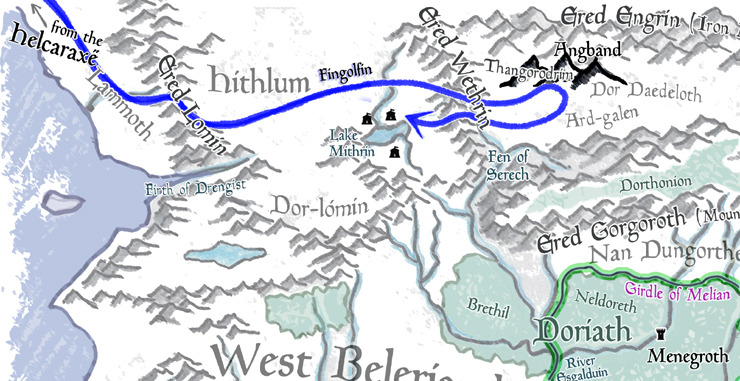
So Fingoflin withdraws and settles in on the north shores of Lake Mithrim. The sons of Fëanor—well, minus Maedhros, who’s been left high and dry—take their leave and settle on the southern shores with their much smaller group of loyal followers. Now the lake, and of course more tension than an Orkish snare drum, divides them. Things are awkward. Can they continue avoiding the Helcaraxë-and-ship-burning-shaped elephant in the room? Meanwhile, from the safety of his dungeons, Morgoth laughs at the poison—that he himself first disseminated among them—still doing its work on the Noldor. Maybe he doesn’t need to destroy Ilúvatar’s precious Children. Maybe the Eldar will do it to themselves.
Just for good measure, Morgoth yanks on whatever pull-chain makes the stacks of Thangorodrim belch out their smoke. Clouds of foulness from the bowels of Angband go drifting westward to settle and eddy around the Noldor, darkening their camps and generally communicating Morgoth’s middle finger to them all. “I can’t come out right now,” he seems to be saying, “but hey, smell this.”
But then something unexpected happens. Fingon, Fingolfin’s eldest son, steps up in a big way. Deciding he wants “to heal the feud that divided the Noldor,” he goes on a solo quest. See, long ago, back before the flight of the Noldor, before the Oath, before the Darkening of Valinor, and before “lies came between them” thanks to then-Melkor, Fingon and Maedhros were really good friends. Despite their dads’ hangups, they got along great. And now the mere memory of that time creates a burning need in Fingon to find his friend again—even as Maedhros’s own brothers seem to have given him up. Even more striking: Fingon doesn’t know that Maedhros had spoken up on his behalf before the burning of the Teleri ships. He’d tried to get his dad to turn back and bear “Fingon the valiant” across the strait first. Fëanor, of course, didn’t cave on that. But as far as Fingon knows, Maedhros never even looked back.
Without telling anyone, Fingon sets out under Morgoth’s concealing stink-clouds. He’s on a one-Elf mission to find and rescue his old chum from the depths of Angband itself. Perhaps one stealthy Noldo can succeed where a trumpet-blasting army cannot. When he gets to the hellish fortress he finds no Orcs or demons out and about—they’re all still cowering from the daylight, much dimmer though it must be around there—yet he can’t find a way in. So Fingon wanders around Thangorodrim’s exterior, hiking, climbing, exploring…and finally despairing. But then he pulls out his secret weapon, a thing so awesome that no power in Dor Daedeloth can possibly contend with it. That’s right, despite the near presence of a horde of Orcs and monsters, Fingon breaks out his…harp! Because he’s an Elf, goddammit, and in Tolkien’s world, an Elf is as badass with a musical instrument as with a sword. So…
he took his harp and sang a song of Valinor that the Noldor made of old, before strife was born among the sons of Finwë; and his voice rang in the mournful hollows that had never heard before aught save cries of fear and woe.
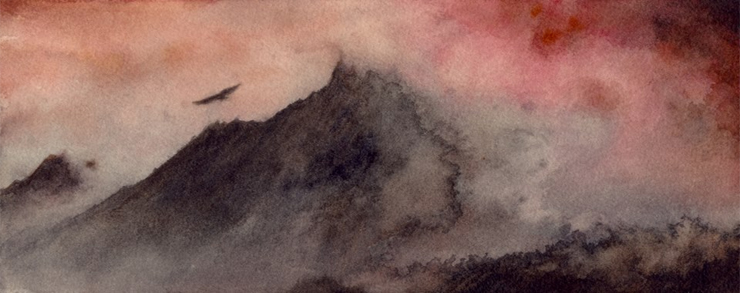
This isn’t strategy. It’s defiance. It’s heartfelt expression. And yet Maedhros in his anguish hears it, and he takes up the song, too. He knows it! Why? Because this is a tune from better days long ago. This was probably a song they played together whenever they jammed in their garage band back in Tilion. So not only are we going to see that Elves sometimes use music to solve problems in other parts of the book, but the very idea of song-based searching for friends is a recurring plot device in Tolkien’s work: Think Sam and Frodo in Cirith Ungol. And we’ll see it again in Lúthien’s tale.
Well, once Fingon locates his friend, the situation is still dire. He cannot physically reach him on the sheer face of the cliff wall, and he can see that Maedhros is in torment. Maedhros begs for death, for a mercy killing in the form of a well-placed arrow. Fingon has a hard choice, but sees no other course. He can’t just leave Maedhros in anguish, yet he can’t free him, either. So Fingon nocks an arrow and calls out a prayer to Manwë, “to whom all birds are dear,” asking for a clean shot with the feathered shaft. Despite having heard Mandos’s Prophecy, knowing that even the “echo” of the Noldor’s “lamentations” will not pass over the mountains to Valinor, he hopes yet for some pity. Creak goes the bowstring…
But ahh, the King of the Valar has already been following the situation, because of course he has. The Valar care deeply, and we learn it immediately when Manwë’s special ops answer the call. Why are they close enough to even help? Because his Eagles have already been dwelling in aeries and crags around the North in order to keep tabs on Morgoth. But note that Manwë gets involved, and indirectly, only as a response to Fingon’s honest prayer. He could surely have sent one of his birds to the Noldor sooner, and told them exactly where to find Maedhros. But that’s not how this all works.
In all the days, months, or possibly years that Maedhros has been hanging in torment on the mountain face, could he have called out to the Valar for help? If not to Manwë, maybe to Varda, who is most loved by the Elves? Maybe, but probably not. This is Fëanor’s eldest son, and he knows where he and his father and brothers stand in the eyes of the Valar. Especially that Mandos, who sure gave them all the stink eye back in Aman. “Slain ye may be, and slain ye shall be” they’ve been told. Maedhros clearly expects to die, anyway.
But it’s Fingon the valiant who takes the risk. This is usually how eucatastrophe (“a sudden and favorable resolution of events”) works in Tolkien’s legendarium. The Eagles won’t just show up and save the day out of nowhere. But stick your neck out first, go at least eight of the whole nine yards, and if you’re doing the right thing, hey, a little bird might just help you out.
And, well, it’s not just any bird that shows up this time.
Now, even as Fingon bent his bow, there flew down from the high airs Thorondor, King of Eagles, mightiest of all birds that have ever been, whose outstretched wings spanned thirty fathoms; and staying Fingon’s hand he took him up, and bore him to the face of the rock where Maedhros hung.
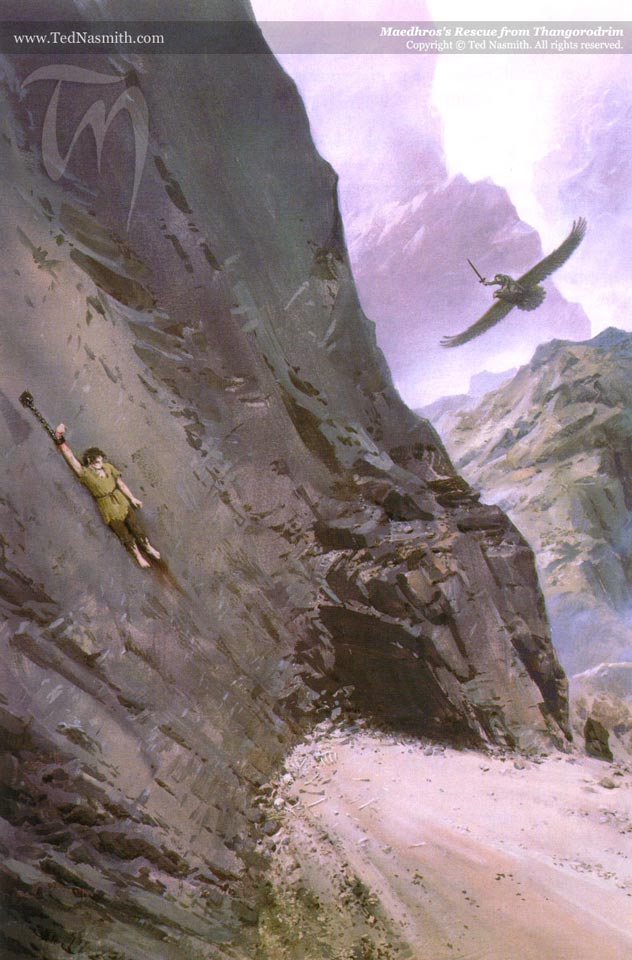
The first thing worth asking is, how wide is thirty fathoms? That’s 60 yards or 180 feet. That’s as wide as the Leaning Tower of Pisa is tall. Thorondor is a big damned bird. He’s at least twenty-four times the size of a real life bald eagle (which can have a wingspan of up to 7.5 feet).
Fingon has to know that Manwë has indeed reserved some pity for the Noldor. But Thorondor is just the ride. And when he reaches Maedhros, there’s no breaking the “hell-wrought” iron manacle that Morgoth bound him with, it’s way too strong. Again, the eldest son of Fëanor figures his time is up and just begs his friend to finish him off. But no way, Josë! A day may come when Maedhros has to take the ultimate dive and accept the end that his father’s Oath has made inevitable—but it is not this day, here on the face of Thangorodrim! Manwë just sent the freakin’ King of Eagles.
So Fingon does what every good friend and wingman would do when his bestie is stuck between Morgoth and a hard place: he cuts off the dude’s hand with his sword. Maedhros and his bleeding arm are thus freed from bondage, and Thorondor bears both Elves away and back to the safety of Lake Mithrim.
If you’re Calaquendi and the light of Aman is not yet dimmed in your eyes, whatever doesn’t kill you absolutely makes you stronger. And Maedhros is a prime example. He heals up and becomes all the more wrathful against Morgoth—and is even more deadly as a lefty!—and he is wiser for the ordeal. Fingon the valiant came through for him. What a guy. Everyone rallies around and praises Fingon, while Maedhros begs forgiveness for ditching them back in Aman. Maedhros is willing to be the bigger Elf (more so than his little brothers) and works to ease the tensions between the house of Fëanor and the house of Fingolfin going forward. Moreover—and this is huge—Maedhros even renounces the kingship which technically would have come to him as the eldest heir of the eldest son of Finwë. He says to Fingolfin, his uncle:
If there lay no grievance between us, lord, still the kingship would rightly come to you, the eldest here of the house of Finwë, and not the least wise.
So Fingolfin will be the King of the Noldor. Now, not all of Fëanor’s sons are cool with this—not even close. But too bad for them, Maedhros is still the eldest and he wants there to be unity among the Noldor. There’s no evidence of this, but I’m thinking he might have employed the time-honored big brother stratagem known as why-are-you-hitting-yourself-why-are-you-hitting-yourself?! In any case, the house of Fëanor is now called the Dispossessed, and they’re going to be kings of a whole lotta nothing. Which doesn’t mean they’re not going to be arrogant lords bossing people around from time to time.
What follows in the second half of this chapter concerns the growing pains involved in the Noldor trying to settle into Beleriand. This is where Fëanor led them, after all, and they’re kind of stuck with it. There’s no going back to Valinor, even if they wanted to (as clearly many of them do). So it’s time to make the best of it and maybe, just maybe—if Fëanor wasn’t totally off the mark about everything—they can still find realms of their own. Such ideas were kindled in the hearts of its princes. Oh yes, and ladies: Galadriel is here with her brothers. She crossed the Helcaraxë, too, as part of her uncle’s host. This lady’s seen a lot of shit in her time, no less than they have.
And we can recall from four chapters ago that Galadriel was eager to be gone from Valinor, eager to come here to these “wide unguarded lands” and possibly govern a land of her own. (She does have a bit of a dominion bent, doesn’t she?) And you can bet her eyes are wide open now. But to her credit, the future Lady of the Galadhrim is in no hurry; clearly Beleriand isn’t entirely unguarded. She’ll do her homework first. And her brother Finrod is now the head of the house of Finarfin, since their mum and dad stayed in Valinor.
So now we come to the politics and a bit of the lingering strife of the Elves of Beleriand. Not to mention some more battles, as Morgoth tries to make trouble and test the strength of those accursed Children of Ilúvatar. He was doing just fine troubling the Sindar before Fëanor and Fingolfin and all these bright-eyed Calaquendi showed up.
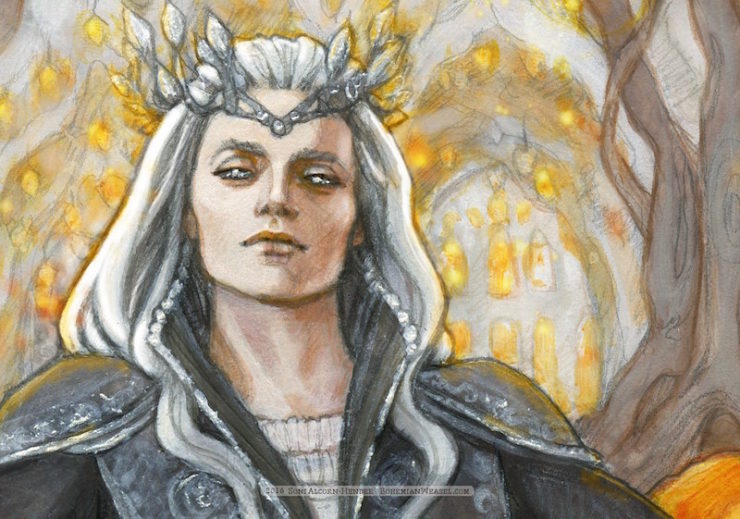
By this time King Thingol is well aware of the return of the Noldor, and he “welcomed not with a full heart the coming of so many princes in might out of the West, eager for new realms.” But the Sindar, his people, are for the most part delighted to see their old friends again. They even assume, naïvely, that the Noldor must have been sent by the Valar to come help defeat Morgoth. (Yeah, that’s not how Mandos tells it….)
But as we’ll see, the Noldor are going to be, as a rule, very tight-lipped about the circumstances of their departure from Aman. Whenever that comes up, they keep it vague or change the subject. Impressively, the Kinslaying cat actually manages to stay in the bag for, like, several hundreds years! That can’t be easy.
But the reunion of the Noldor and the Sindar is mostly a glad one. The last time these former Teleri—that is, those who kept stalling and the ultimately decided not to take Ulmo’s ferry-island to Valinor—saw their Noldor friends was many thousands of years ago! And at first, there’s a bit of a language barrier to get past. You know, due to the “long severance” of “the tongues of the Calaquendi in Valinor and of the Moriquendi in Beleriand.” The Noldor speak Quenya while the Sindar are speaking Sindarin. The Noldor are quick to master and use the Sindarin tongue, so this is smoothed out before long.
Thingol is uneasy, though. The Noldor are here, but…where’s Finwë? These two were BFFs in the good old days of Cuiviénen. Remember way back then? They were so young! At this point, though, Thingol has a tendency to distrust all non-Sindar he hasn’t got family ties with. Which means the only ones with an open invitation to visit him in Doriath are the children of Finarfin (Finrod, Orodreth, Angrod, Aegnor, and Galadriel) because Finarfin had married Thingol’s own niece, Ëarwen. Who was, incidentally, called the Swan-maiden of…ahem, Alqualondë (you know, of the Kinslaying at Alqualondë).
Well, it’s Angrod who goes first. He sits with Thingol and tells him the full story of the Noldor’s journey from Valinor. Well, if by “full” we mean everything but the whole flight aspect of it, the Kinslaying or why it would even come up that Fëanor would want Teleri ships, and anything about an oath or a prophecy. And he definitely says nothing about Mandos hollering at them from a mountaintop or anything crazy like that. Still, Thingol accepts Angrod’s watered-down, omission-heavy account at face value, as he’s mostly interested in numbers, hierarchies, and all the Orc skirmishes up in the north. He’s a king who thinks about kingly things like dominions and rulership.
And so Angrod returns to the rest of the Noldor with a laundry list of places Thingol said they’re allowed to settle in—notably Hithlum, Dorthonion, and the “empty and wild” lands east of Doriath.
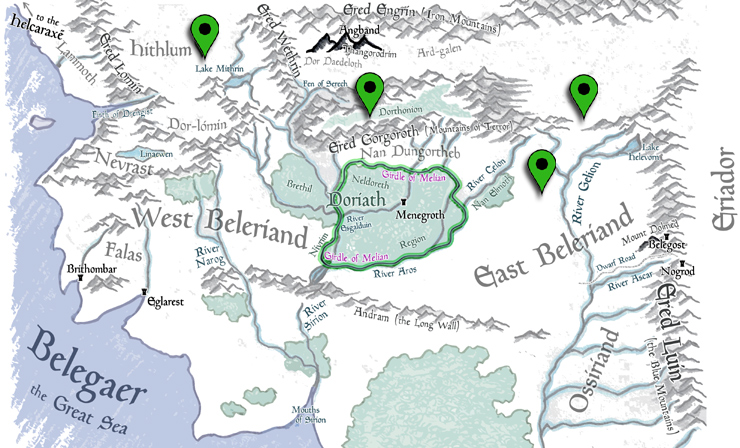
Fëanor’s sons are immediately pissed. Even the higher-minded Maedhros understands that Thingol is just handing out places he himself doesn’t already control. And that Thingol would obviously be glad to have non-Sindar occupy such regions just to serve as meat-shields between himself and Morgoth. Fingolfin and Finrod just accept it straight-up, though; they’re glad of any peace they can have and are more concerned at present with keeping an eye in Angband’s direction. Sharp-tongued Caranthir, the fourth son of Fëanor, starts trouble by questioning why it was Angrod who even went to meet with Thingol in the first place. To prevent further conflicts in the family, Maedhros reins in his brothers.
So the first to go and secure lands that they can slap their names on are the sons of Fëanor. Maedhros, as the most mature and selfless of them, actually accepts the wide open land to the east and north that has no natural barriers against Morgoth. This becomes the March of Maedhros, and the Elf thereby makes himself the first line of defense against their foe. But he also steers his brothers in this direction to keep them away from Fingolfin in order to “lessen the chances of strife.”
Meanwhile Caranthir settles into the valley around Lake Helevorn where he can set up trade with the Dwarves who traffic into Beleriand from their cities Nogrod and Belegost. Caranthir is no friend to the the Dwarves, as he can barely hide his “scorn for the unloveliness of the Naugrim,” but he’s an Elf with good business sense. He and the Dwarves find their common ground—crafting is one thing both Noldor and Naugrim are into—and thus they profit from one another. Plus they both hate Morgoth, so at least there’s that.
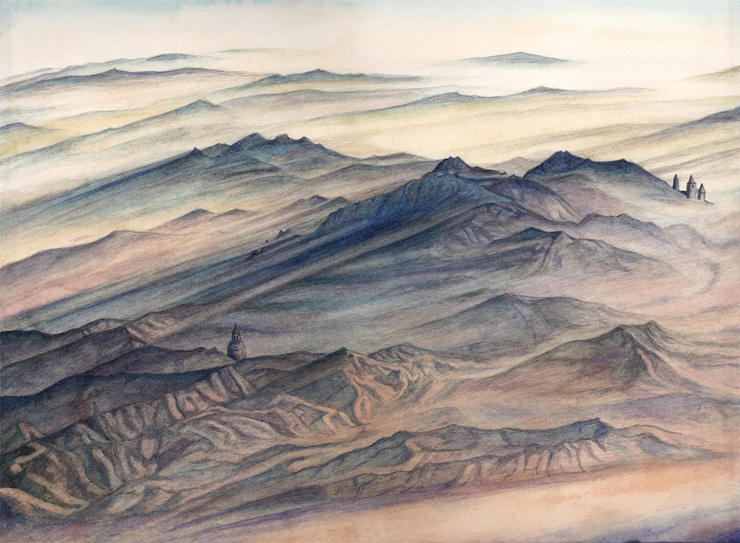
And now we span some time. Twenty years, an eyeblink to the Elves, go by as the Noldor settle into their respective pockets and corner realms. Fingolfin then has the temerity to host a big celebration and hope that Morgoth doesn’t crash it; he chooses a green and scenic spot where the River Narog comes together at the foot of Ered Wethrin, the Mountains of Shadow.
Now this is a Noldor-hosted (and, I assume, -catered) event, but all Elves are welcomed. Called the Feast of Reuniting, almost everyone who can attend does, from far and wide. All the important Noldor princes, lords, and ladies…minus five of the seven sons of Fëanor (big surprise). Green-elves and Gray-elves galore come, even Círdan and some of his Elves from the Havens. Only two members from Thingol’s court attend (meaning that the king and queen noticeably do not): Mablung and Daeron, chief captain and chief loremaster respectively. Both of these chaps will play roles in Lúthien’s tale several chapters from now. Suffice to say they’re both tight with Doriath’s royalty.
Awesomely, the feast goes off without a hitch. No Orc attacks, no angry words, nothing gets toppled. Friendships are renewed and oaths of loyalty are made as High Elves, Gray-elves, and Green-elves do what Elves do best: they talk, they tarry, they make merry. This is when the Noldor really start to learn and adopt the Sindarin language. Also, there’s no way the Moon and Sun and all the new varieties of plant life aren’t big conversation pieces. Not to mention all their different names for these things.
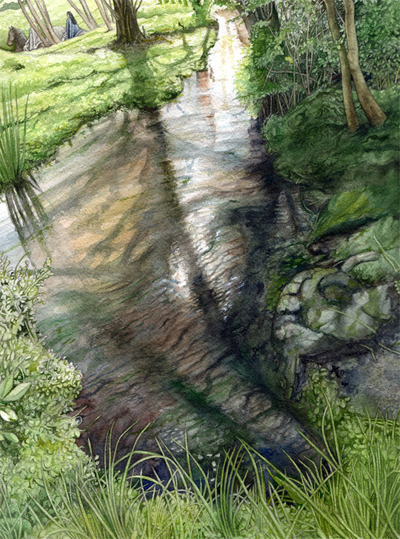
The Moon and Sun have only been swishing across the sky for some twenty years now; that’s nothing to Elves, many of whom were at Cuiviénen and are still accustomed to thousands of years of starlight only. Back in their day, there was none of this newfangled “daytime” that all the youngsters keep going on about. And gosh, it sure is a lot warmer than it used to be! What’s with the different phases of the Moon? And have you noticed we’ve got clouds now?
Another thirty years go by with still no problems from Morgoth’s corner of the world, aside from his passive aggressive brooding. Then one day, Turgon and Finrod, another pair of cousins who are good friends, go adventuring together along the River Sirion. Finrod, if you remember, was one of the more reluctant-to-leave-Valinor among the Noldor, and it was Turgon who lost his wife to the icy teeth of the Helcaraxë. It feels like their wanderings are perhaps a time for both to do some soul-searching in nature.
And so it’s probably not by chance that Ulmo, the busybodiest of the Valar (in a good way), chooses these two Elves to mess with (in a good way). We were explicitly told back in the Valaquenta that Ulmo “loves both Elves and Men, and never abandoned them, not even when they lay under the wrath of the Valar.” Valinor might have NOLDOR NOT ALLOWED signs hanging on its mountain-fence, but Manwë never forbade the Valar from coming over to Middle-earth. After all, we already know he’s still got his Eagle eyes in the sky.
Being one of the most learned of the Music of the Ainur, Ulmo has some insight into the troubles that Morgoth is going to bring, so his plan is to prompt both Turgon and Finrod to help guard against them. While the two are adventuring together, Ulmo slaps them both with “heavy dreams” one night when they’re passing through the Meres of Twilight—a lovely place where the rivers Aros and Siron meet.
These Ulmo-inspired dreams “trouble” the Elves but also fill their heads with ideas and thoughts for the future. They don’t discuss them, as each Elf thinks he might have been the sole recipient of such dreams.
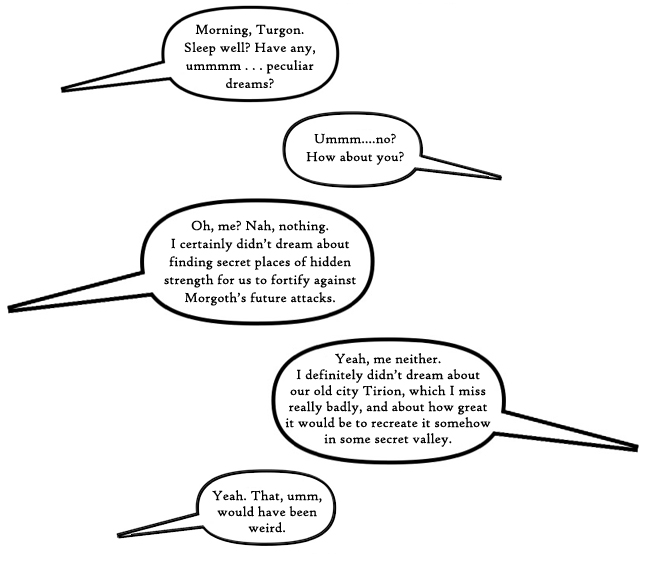
Once they go their separate ways, Finrod travels with his little sis, Galadriel, to visit Doriath. He’s uber-impressed with the beauty—and more importantly, the defensibility—of the city Menegroth, the Thousand Caves. He even confides in his Telerin mom’s uncle, King Thingol, telling him about his secret dreams. Thingol obviously likes the young Elf, even if he is one of these upstart Noldor. (And frankly, who wouldn’t like Finrod?) He tells him about the deep gorge of the River Narog and the wooded highlands of that region, suggesting that those might be good places to poke around. Remember, Thingol was wandering and ruling Beleriand for a very long time. He’s been around. He knows all the best spots.
Not only does Finrod find and love the Caverns of Narog, he gets to work making a fortress out of it. I’m thinking he even has his Dwarven contractors recommended by Thingol, because it’s with the help of the Naugrim of the Blue Mountains that this new stronghold, Nargothrond, is carved—just as Menegroth had been. And Finrod pays well! He brought more gems from Valinor than any Noldor, which means he probably had heavy chests and coffers of jewels carried across the Helcaraxë by Elves of his father’s court. But knowing Finrod, he wouldn’t have just sat back and made his servants do all the heavy-lifting. Dude probably carried the heaviest ones himself.
Well, the Dwarves also become fond of Finrod, so much so that they even give him his own name in their language of Khuzdul (because Tolkien), which is a huge sign of their esteem for him. Whereas I assume the Dwarves come up with insulting, spoken-only-behind-the-back nicknames for all the haughty Elf-lords they’re use to working for, they instead call Finrod Felagund, Hewer of Caves. It’s freakin’ badass for Elf to have a Khuzdul epithet.
The Dwarves even craft for Felagund a necklace, or “carcanet,” of gold which is strewn with Valinorian gems. Called the Nauglamír, it’s the “most renowned of their works in the Elder Days,” and it’s being introduced to us now to foreshadow some actual drama later. In general, when a piece of jewelry gets named in Tolkien’s legendarium, you can bet someone’s going to fight over it sooner or later.
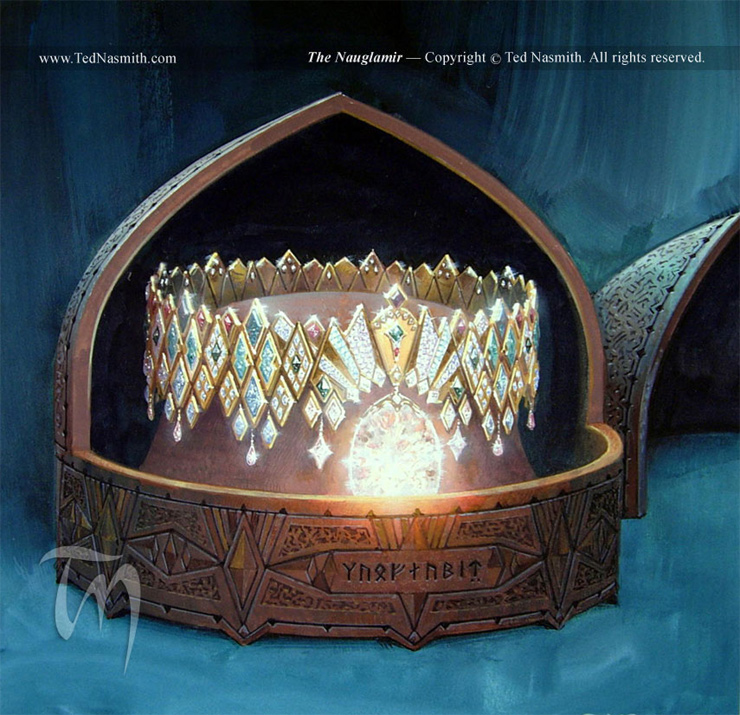
Now Galadriel chooses not to go and live in her brother’s realm because she’s loving it in Doriath. Also, she wants to stay and see about a boy, a nice Sindar chap named Celeborn (KEH-leh-born). You might have heard of him? He also happens to be related to the king. And now that Galadriel has met Melian, a straight-up Maia queen, well, she’s clearly found herself the perfect mentor. One who knows about ruling a forest realm, dispensing wisdom, and preserving beauty and power for as long as she can. All duties Galadriel would very much like to employ herself one day.
Turgon, meanwhile, doesn’t go quite as far as his cousin Finrod with establishing a new stronghold. Not yet. He returns to the coastal region of Nevrast where a bunch of the Noldor have settled, and he hangs out by the shoreline. There he pines for that great Noldorin city on a hill, Tirion, which now lies far across the Great Sea in a land he’s been banned from. Which sucks. Those were happier times; you know, back when he had a wife and that prick of an uncle, Fëanor, hadn’t wrecked everything yet.
Well this time, Ulmo just shows right up. The Lord of Waters doesn’t beat around the bush with weird dreams this time. He manifests in person and gives Turgon explicit directions on where to look: the well-hidden valley of Tumladen in a section of mountains just west of the spider-haunted Mountains of Terror, Ered Gorgoroth. So Turgon treks out to this secret place alone, taking the visit of a Vala quite seriously. Now, having seen the vale with his own eyes, Turgon goes back to Nevrast, hangs with his people, and starts working on the blueprints for the amazing city he intends to construct as a tribute to old Tirion.
Yeah, the kids and grandkids of Finwë have been busy this chapter! The names can get still confusing, even this far in. So let’s review what’s going on with them.
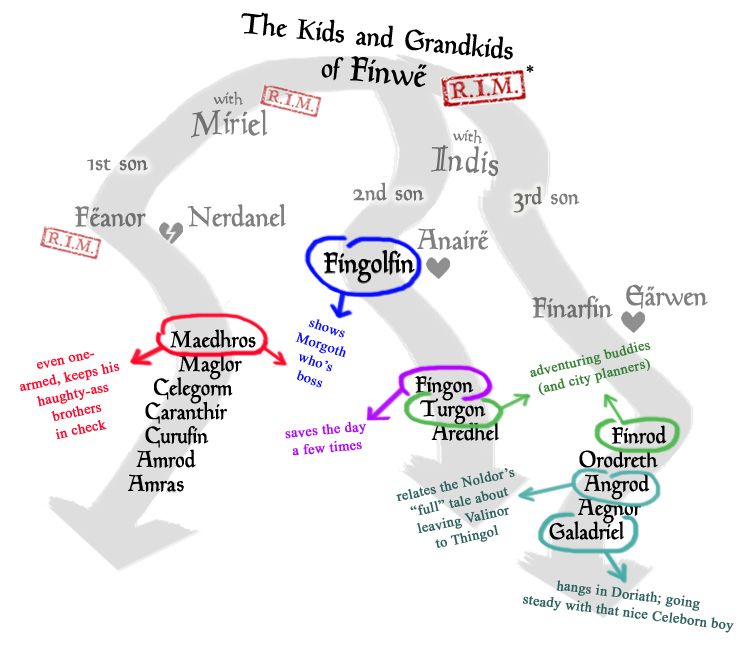
It’s around this time that Morgoth finally decides it’s time to test the Elves again. Maybe with all their feasts and peaceful meetings they’ll be ill-prepared for another fight, so he sends some Orc hosts out across the plains again. Heralded by “vomited flame” from peaks in the Iron Mountains, and even by earthquakes, the Orcs spill out from Angband’s gates again in large numbers. It’s been a while!
One wave goes west and tramps through the Pass of Sirion, while another rounds the mountains in the east and hikes through the lands Maedhros and his brothers had claimed. They’re not so much single armies as scattered bands terrorizing anyone they can find. Then a more central force pushes right in towards Dorthonion, which is the highland where some of the other sons of Finarfin have settled.

But Fingolfin and Maedhros have actually been watchful and are ready for this. They rally their own forces and clamp down on the Orcs on either side. Retaliating fast and hard, the Noldor mop the floor with the Orc bands before going on to crush the central host. Once more the Eldar chase their foes back across Morgoth’s front yard of Ard-galen and slay every single one of them. This effort goes up on the Wars of Beleriand list as Dagor Aglareb, the Glorious Battle. That’s two great victories for the Elves now.
We should probably start a list…

Not only is this a victory for the Noldor and a moment of solidarity between Fingolfin and Maedhros, it unifies them in the leaguer, or siege, that they realize they’ve got to begin. Both draw their forces in closer to Angband, and this does hem in Morgoth for a very long time. His servants are rightfully fearful of Noldor blades. But…
Fingolfin boasted that save by treason among themselves Morgoth could never again burst forth from the leaguer of the Eldar, nor come upon them unawares. Yet the Noldor could not capture Angband, nor could they regain the Silmarils; and war never wholly ceases in all that time for the Siege, for Morgoth devised new evils, and ever and anon he would make trial of his enemies.
Ugh, never boast, Fingolfin! But even though this is kind of a stalemate, the truth is the Noldor have contained Morgoth. He still sends out spies, if not armies, and as the years roll by he even manages to send out small Orc bands to capture some Elves alive. These are brought before him and with his own eyes he instills in them a terror they’ve never known. This introduces a horrible new stigma in the cultures of the Eldar, a “fear and disunion” that we’ll see more of in days to come. Morgoth will cetainly “not lack of a harvest” from this forced dissension.
Thus he makes from his Elf captives a variety of slaves, first learning from them, then putting them to hard labor, and then eventually setting them free. Free but enthralled, fearful to cross him, and so even when they’re recovered by their kin they’re never wholly trusted again. I mean, what if they’re spies now? What must it be like to look in the haunted eyes of an Elf who, being an Elf, has seen the beauty of Valinor and the light of the Trees and yet has looked into the face of Morgoth firsthand? An asshole of the first order, that guy is.
Another hundred years goes by in relative peace—not counting the disquiet of the occasional catch-and-released Elf—and Morgoth decides to test the leaguer. A bunch of Orcs heads out to the west along the coastline, but they’re too small a force and are so soundly eradicated by Fingon and his Hithlum-dwelling folk that no one bothers to give the conflict a name. Well, being Elves, I’m sure they did, but it’s not “reckoned among the great battles.” It doesn’t go up on the big Wars of Beleriand board.
Then another hundred years goes by.
One night, out of the main gates of Angband comes something no Elf’s even heard of before. A fire-drake! A dragon! The very first of his kind, fresh from the monster-making basement labs of Angband. Glaurung is his name, father of all dragons, and Morgoth didn’t actually mean for him to bust out just yet; but clearly someone—maybe some Orc who turned his back on the cage at the worst possible time—screwed up, and out Glaurung went! Now he’s still young, and dragons live long; he’s barely half the size he’s going to be.
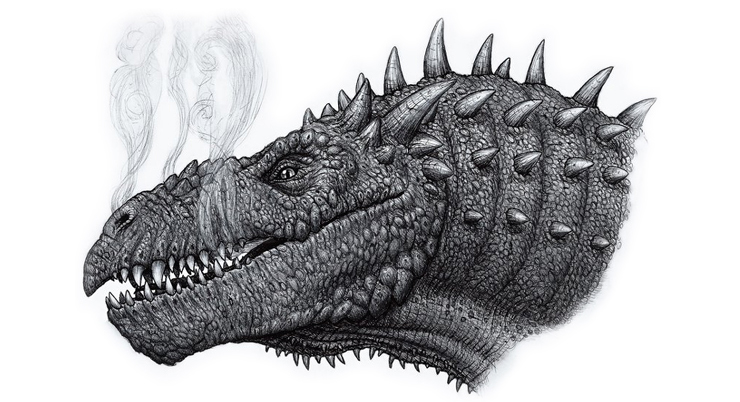
But dragons are no joke. They’re still big and terrible beasts, and in time we’ll even see how cunning and downright underhanded they can be. Especially this one, who’ll prove to be the mightiest of his kind (if not the physically largest). Like all of Morgoth’s creatures to date, Glaurung has no wings, but he still has a breath of fire and his mere presence “defiles” things. Dragons in Tolkien’s legendarium might be wonderous, after a fashion, but they’re not as elegant as dragons can be in other stories and worlds. There is a loathsomeness to them, and the older they get, the fouler they become—and these creatures have an ecological impact as well. They’re walking biohazards.
The Elves fall back from Ard-galen, dumbfounded and dismayed by this unexpected R&D project of Morgoth’s that’s just been unleashed. But eventually, before the dragon gets too far, Fingon rides with his Hithlum warriors and they pepper him with arrows. As armored as dragon-hide must be, Glaurung is bothered by this. Let’s just say his Armor Class and Hit Points just aren’t what they’re going to be, many years from now. So he turns and flees back to Angband.
But Morgoth was ill-pleased that Glaurung had disclosed himself oversoon;
You just know the Orc responsible for Glaurung’s premature release definitely got sacked. Well…“sacked.” And don’t mistake it, dragons are smart—very smart, even this first one. Merely with words, some well-placed seeds of doubt, and the power of his gaze, Glaurung is going to do far more damage in chapters to come than any rake of his claws or blast of his breath.
Strangely, though, the Elves don’t take Glaurung too seriously. Maybe they think the drake was just some strange anomaly—when really the takeaway should be, “Holy crap, Morgoth’s breeding some crazy new monsters! What else has he got up his sleeve?!” But instead, two hundred more years are going to pass with little conflict except for some unnamed skirmishes on the borders. Beleriand prospers, the Elves generally get along with one another, and they get to work putting more roots down.
Things are looking up.
Just a warning, though: You, dear first-time reader, probably won’t be prepared for the high-octane, action-packed thriller of the next installment of this Primer, in which I tackle the legendary roller coaster thrills of Chapter 14, “Of Beleriand and Its Realms,” and the verbal discourse of “Of the Noldor in Beleriand.” Buckle up!
Top image: “Fëanor’s Last Stand” by Kenneth Sofia
Jeff LaSala, on his death bed, would never make his son renew a terrible, life-scathing oath. What the hell was Fëanor thinking?! Tolkien nerdom aside, he wrote a Scribe Award–nominated D&D novel, produced some cyberpunk stories, and now works for Tor Books.










